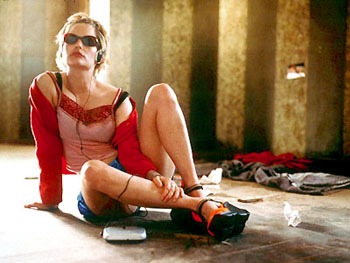![[Metroactive Movies]](/movies/gifs/movies468.gif)
[ Movies Index | Show Times | San Jose | Metroactive Central | Archives ]
 Sahara Club for Women: Jennifer Jason Leigh takes a desert disaster in stride in 'The King Is Alive.' Dogme Bites Men, Women Lost souls stage 'King Lear' in the deep desert THE DANISH filmmaking movement known as Dogme 95 keeps running over the moviegoer's karma. Whether this Dogme has had its day or not, Kristian Levring's The King Is Alive brings the austere scheme one improvement, gleaned from the primitive filmmakers circa 1910: if you're going to shoot in available light, head to the desert where there's plenty of light available. The King Is Alive is the best looking of all the Dogme 95 films. The digital cameras pick up how the actors' sweaty bodies are gilded with sand; and the red Sahara dunes give some scenes the power of a miniepic. Do people go to Dogme films for their visual qualities, though? The idea of film constrained by aesthetic laws must be a search for the formal beauty of haikus and sonnets. But the Dogmatics aim for capturing a rawness that regular filmmaking won't allow. Thus the films all seem to be one improvised squabble after another. In The King Is Alive, a busload of passengers takes a wrong turn into the Sahara. The bus breaks down in an abandoned mining town where there's nothing to eat but rusty cans of carrots. In the bus are the ex-harlot Gina (Jennifer Jason Leigh); a hostile American couple (Bruce Davison and Janet McTeer); Charles (David Calder), a smug, obese businessman; and an elderly drunk (the once-frightening character actor Brion James, wasting away in his last role). McTeer is the most unbearable of the lot. Her "Liz" is plainly a braying Liz Taylor out of Who's Afraid of Virginia Woolf, throwing herself at men because she's never had the child she craved. The mother's milk has soured within her much-vaunted breasts. Within days, the group is transformed to Survivor Part III, strugglers in "a godforsaken place with all these lost souls." No group of lost souls is complete without a bloodless intellectual, like Harry (David Bradley), who decides to while away the time with an amateur theatrical--a desert production of King Lear. As the cast stews in their juices, they're watched over by the abandoned town's sole inhabitant, an African villager named Kanana (Peter Kubheke). In the voice-over, he wonders over their reluctance to bond together instead of attacking one another By his muteness, the old silent witness asserts his superiority over the battling castaways. His simple way of life, involving just sitting and staring, would seem all the more enlightened if he actually raised a finger to help the travelers--if only a finger to flip them off. But it's a metaphorical desert, and he's a metaphorical geezer, accepting fate with the ancient calm of Africa, so unlike the European fools forestalling the inevitable end with games, seductions, rivalries and vanities. Ultimately, our much-vaunted civilization is just a thin layer of civility over barbarism, this film pronounces. This "thin layer of civilization over barbarism" is the second most exhausted subject in films today, right after the plight of the lovelorn urban single. Isn't the thin layer of barbarism over our civilization much less observed and more challenging to the filmmaker, Dogme-atic or otherwise?
The King Is Alive (R; 105 min.), directed by Kristian Levring, written by Anders Thomas Jensen and Levring, photographed by Jens Schlosser and starring Jennifer Jason Leigh, Janet McTeer and David Calder, opens Friday at Camera 3 in San Jose. [ San Jose | Metroactive Central | Archives ]
|
From the June 7-13, 2001 issue of Metro, Silicon Valley's Weekly Newspaper.
Copyright © 2001 Metro Publishing Inc. Metroactive is affiliated with the Boulevards Network.
For more information about the San Jose/Silicon Valley area, visit sanjose.com.